- Home
- Victor Gischler
Gestapo Mars Page 8
Gestapo Mars Read online
Page 8
“Get lucky? What the hell does that mean?”
“It means I don’t know.”
“That’s pretty feeble,” she said.
“That’s what I like about you,” I said. “Your wide-eyed optimism.”
The hatch opened and the gangplank lowered. We disembarked cautiously, Meredith pivoting constantly with the gyro-jet rifle, ready and willing to blast all assailants into dust. I’d availed myself of her weapons locker. A 12mm pistol hung on my hip, extra magazines clipped to the belt, and there was a small laser pistol in my pocket as a backup.
“Let’s try in there first.” I pointed at the least damaged hangar.
It was empty. The next one held a sub-orbital shuttle, still in pieces as if it had been abandoned mid-repairs. No sign of people, fuel, or anything useful. Certainly no spare translight drives sitting around waiting to be scavenged.
Back out on the airfield, I took a look around. The passenger terminals were all the way on the other side of the runways and landing pads, but the control tower was closer—fifty yards away across open ground. We stood together in the recessed doorway of a hangar, and I took one more long careful scan of the grounds, trying to see into every shadow.
“Listen to me,” I said. “I’m going to break for the tower. You count to five and run after me.”
“No.”
“I don’t want us bunched up in case—what do you mean no?”
She looked at me like I was the stupidest man alive. “You want me to run in these?”
I looked at her boots. Three-inch heels. “Why the hell would you wear those?”
“They make me taller,” she said. “Also they really make my calves look great.”
“And you think that’s important now, of all—your calves do look amazing,” I admitted. “But really, didn’t you have anything more practical to wear?”
“Excuse me, but I wasn’t expecting to spring into action.”
“So you have a gyro-jet rifle, but no sensible shoes.”
She cleared her throat. “I can see how that might seem inconsistent.”
I sighed. “Okay. Then count to five, and just follow as fast as you can.”
Before she could reply I dashed for the control tower, zigzagging slightly, but nobody blasted me. I glanced back at Meredith coming at a fast walk, long, confident strides, the clack of her high boot heels echoing across the airfield. She looked like the best-armed runway model in the galaxy.
I reached the entrance to the tower, and a few moments later she made it to my position. We entered the control tower quietly. The gyro-jet rifle was long and cumbersome in the tight hallway, so she slung it across her back and pulled a sonic blaster from her belt holster.
We were in some sort of dimly lit reception area—desk, chairs, computer stations, all undisturbed, like the place had simply been shut down for the night, instead of abandoned in the middle of a bloody revolution.
Moving to the elevator, I pressed the call button, but the power was out except for the batteries running the emergency lights. We found the stairs and climbed. On the second floor, we stepped into a hallway. Meredith opened her mouth to say something, then froze. Her eyes slid sideways.
Then I heard it, too.
Somebody was humming.
I motioned toward the corner, and Meredith nodded.
Just as we began to ease around for a look, the sharp sound of shattering glass stopped us in our tracks. A moment later, the humming resumed.
Noiselessly she and I slipped around the corner, Meredith being extra careful to step softly in her ridiculous boots, guns up in two-handed grips and ready to shoot.
It was some sort of lounge area. A fat man in a greasy set of gray workman’s coveralls stood in front of an automated vend-o-mat machine. The glass window had been busted out, and his arms were overflowing with packages of cookies, chips, chocolate, and snack pies. The humming became whistling. Satisfied he had all he could carry, he turned toward us and froze, eyes going wide at the gaping barrel of my 12mm.
“Are you going to shoot me?” he rasped.
“That depends,” I said. “What’s your name?”
“Max,” he said. His eyes bounced from my face to the Swastika patch on my jumpsuit and back again. “Are you Reich? Jesus, I sure hope the hell you’re a Reich rescue force.”
“For the time being, let’s just say we’re not with the resistance,” I offered. “Good enough?”
He thought about that for a second then nodded. “Okay.”
“Let’s have a nice little chat, Max,” I said, “and we can talk about not shooting you.”
FIFTEEN
We sat around one of the lounge’s duramica tables, digging into Max’s plunder. He’d decided to share, as a show of gratitude for not shooting him. I drank an orange soda and ate a packet of chicken vindaloo potato chips.
Max recounted his experience since the uprising. He’d been a mechanic at the airport when the shit had hit the fan. At first, Corsica hadn’t been touched—the conflict just something troubling on the newsfeeds, most of the violence and conflict happening inland. But soon it became apparent that no place was safe. Residents who could afford it fled to the spaceports, but those were soon overrun and held by the resistance. So people fled to the coast, hopping ships that took them to islands still held by the Reich.
Yet Max, like a bunch of others, couldn’t quite believe what was happening. Surely the local police would get organized and put a stop to things, and if the situation was really that serious, the Reich would step in to restore order.
Right?
Then one day Max was lubing a hovercraft when right before his eyes a firefight broke out between resistance warriors and Reich troops from the garrison. He turned tail and ran all the way to his little prefab dome house three miles from the airport. His first thought was to gather his wife and family and make for the coast, but his wife reported that all the roads were blocked.
They were too late.
So he and his family huddled in their little house, not daring to go outside, covering the windows so no light would escape after dark. They did nothing to draw attention to themselves. They listened as the news reported a rapidly deteriorating situation. Then the news reported nothing at all.
A few days later the radio came back on the air, now under resistance control, the fiery announcer decrying the Reich and proclaiming the glory of the revolution.
And then the food ran out.
Max was forced to venture out lest his family starve. At first he tried the restocking hangar, where ships were resupplied with prepackaged in-flight meals, but the place was a mess, already looted by desperate citizens. If they’d already scavenged as far as the airfield, he figured, then the markets in town were certainly already picked clean.
Then Max remembered the control tower lounge vending machines.
“I don’t know how long we can live on Choco-Yahoos and Mongolian BBQ Chips, but food is food,” Max said. “Damn, I was really hoping you guys were the point of a Reich rescue force.”
“We’re not even sure about rescuing ourselves,” I told him. “Unless you happen to have an extra translight drive stashed somewhere.”
Max’s eyes flitted from me to Meredith, then down to the Choco-Yahoo. He took a bite, chewing and not looking at us.
Meredith touched my arm, raised an eyebrow.
I nodded, and turned back to Max.
“Max?”
He looked back up at me. “Yeah?”
“Is there something you want to tell us?”
He shrugged, shifted in his chair, took another bite of the Choco-Yahoo. Swallowed. “I might know where you can lay hands on a translight drive.”
Meredith and I both tried talking at once. Where was it? Could he show us?
Max put up his hands, palms out. “Whoa. Hold on. It might not fit your ship, and you’d need a translight-rated mechanic to install it. A lot of ifs pile up with something as complicated as a translight drive.”
Max shook his head. “Sorry, miss. That’s about a million ratings above my pay grade.”
“You could try,” I said. “You have tools here, right?”
He scratched his head. “Well… I’d need the computers back online. I suppose…” He looked off at some invisible horizon, the wheels turning. “You know, I might not have to install the whole drive. Maybe just cannibalize some of the parts. I could look at your drive, see if the problem’s simple enough…” He snapped his attention back to me, eyes focused and alert. “Okay, but you’ve got to do something for me. Or forget it.”
“We didn’t shoot you,” I reminded him.
“You were never going to shoot me,” he said. “You’re not those kind of people. I can see that now.”
“Okay,” I said. “What do you want?”
“My family. You’ve got to take us off planet. This place is fucked. I don’t think anything’s going to put it back right again. There’s blood in the streets out there, man. It’s bad.”
“I would be happy to have you aboard my ship, Max,” Meredith said. “Of course we’ll take you and your family to safety.”
“That’s not all of it,” Max said. “You’ve got to bring them here. The control tower is a good spot. Defendable. I’ve thought about it. There are tunnels running to most of the other buildings, and there’s a generator in the basement. But you’ve got to get my family here. You’ve got weapons. You go get them. Get my family here safe, and I’ll do it. I mean, I’ll try my best. It’s a translight drive, but put a wrench in my hand and we’ve got a fighting chance.”
It sounded like a good way to get killed, but what were the chances of finding a mechanic and a translight drive in the same place again? I stuck out my hand and Max shook it.
“Deal.”
SIXTEEN
He drew us a map. Meredith and I checked our weapons and set out.
Max’s prefab dome was in a rural neighborhood off the beaten path. Perhaps the word neighborhood was being generous. More like a scattering of cheap blue-collar homes at the end of a dirt road.
We tried to keep under cover as much as possible, ducking behind burnt-out automobiles, the edges of buildings, trees. Nobody in sight. Newspapers and fast food wrappers blew across the streets like tumbleweeds. In an hour, we were on a dirt track, crossing open countryside, low hills, and grasslands.
“We’re really exposed out here,” I said, my eyes constantly scanning for signs of trouble. “If you see anything, go flat in the tall grass. That’s about our only chance to keep out of sight.” I looked at her and frowned. “I wish you weren’t wearing red.”
She tsked. “First my boots, and now you’re complaining about my outfit. I thought you appreciated the way I look.”
“You look too good, lady,” I said. “This is one of those times when blending in is a lot more useful than being the shiniest object at the party.”
“I’m learning,” she said. “Next time I’m stranded on a planet in the middle of a resistance uprising with a broken translight drive and have set off to rescue a mechanic’s family, I’ll know how to dress more appropriately.”
We climbed the gentle slope to the top of a low hill and looked down a scattering of cheap dome houses. Max told us his dome was number six. The dirt trail led straight through the little village, but we were too far away to make out numbers. There weren’t any personal transports in front of any of the domes—all the neighbors had cleared out weeks ago. He’d broken into all of their domes, looking for food without finding much.
I was about to suggest that we trudge down the hill and find number six when I saw the group of them come circling around one of the domes on the far side of the village. I grabbed Meredith by the wrist and pulled her down into the long grass, putting us flat on our bellies.
“What is it?” she whispered.
“Over there,” I hissed. “Look.”
Five of them in raggedy fatigues and floppy bush hats. At least three had submachine guns slung on their shoulders, and the other two had pistols hung from their belts. One of them kicked in the door to the nearest dome, entered, and came out again five seconds later, shaking his head.
“They’re scavenging,” I said.
They went to the next dome, kicked in the door, repeated the procedure.
“Max’s family,” hissed Meredith. “They’ll find them.”
“I know.”
Running down there and gunning it out with them was a non-starter, but we had to come up with something, and fast. They were already moving to the next dome. Sooner or later they’d come to number six.
“How are you with that gyro-jet rifle?”
She frowned. “I’ve never fired it.”
“Hand it over.”
I checked the magazine and flipped up the digi-scope, sighted down the barrel toward the group, flicking the zoom and bringing them up close. I could see them in detail now. Greasy unshaven faces—hard, gaunt-looking men. They were the sort who would slit your throat for a stack of pancakes, and then light your dead body on fire for the butter and syrup.
The Heckler & Remington nine-gauge gyro-jet rifle was, in fact, just about the perfect weapon for this situation. For in-close work it’s no good—the gyro-jet shells need at least twenty feet to work up a good head of steam. But for long range, with an expensive and accurate scope—which this was—a sniper could do a lot worse than hunker down hidden in tall grass at the top of a hill.
The explosive tips of each gyro-jet shell could punch through all but the best and thickest armor. The more I thought about it, the more I couldn’t wait to squeeze the trigger.
So I stopped waiting. The rifle bucked in my hands, the shell speeding toward the guy I’d pegged as the leader. His head exploded in a spray of red mist before they’d even heard the shot.
I watched the mayhem in the scope, the others darting in different directions, trying to figure out where the shot had come from so they’d know where to hide. I shot again just as a burly fellow dove behind a row of trashcans, caught him in the shoulder. I saw the arm fly up and spin away, still clutching a pistol as the rest of his body landed hard behind the cans. He’d bleed out back there so I forgot about him, swinging the rifle back toward the others.
They wised up, figured the general direction the shots had come from, and were sprinting the opposite way—away from me and the dome village. I took aim on the center guy’s back, sticking the crosshairs right between his shoulder blades, but I didn’t shoot. Not yet. I was playing now, seeing what I could do.
Let him run.
Another ten yards.
Twenty… Thirty.
They were reaching the limits of the rifle now. A bead of sweat rolled down my nose as I held the rifle perfectly still, gaze unwavering. They were so far away, the shot was all but impossible.
I fired.
It was too far. I missed the center of his back.
And hit him just below the left knee.
He flipped end over end, the left calf flying away in a spray of blood. His pals didn’t even slow down, kept running until they were nothing more than terrified dots on the horizon.
I rose to one knee, scanned the area with the rifle’s digi-scope. All clear. I stood, handed the rifle to Meredith standing next to me, turned to look at her when she didn’t take it.
She took a step back, and looked at me like I was a stranger, like I was some evil thing that had slithered out of the sewer. Her face so pale.
I realized I’d been smiling. Pleased with myself.
I let the smile drop.
“What did you think this gun did?” I asked her. “Who did you think I was? This isn’t your black-tie revolution, rich girl. This is the real thing. Everyone out here is playing for keeps.” I was starting to get irritated. “Max is cowering back at the airfield because he’s worried every day that his wife will be raped and his kids sold into slavery by those guys
I just blew apart. Wrap your head around it.” I held out the rifle again. “Now take your goddamned gun.”
She took it from me slowly, not able to meet my eyes.
We turned and walked down the hill. I felt her gaze on my back. She hadn’t deserved that. She wasn’t equipped for any of this, didn’t know she’d thrown in with a killer.
I’d been so damn proud of myself, thought I was such a big man cutting down those hoods from my hiding place in the grass. Then to turn and see the stricken look on her face, like some betrayal. But all she’d really seen was the truth. The truth about me, that I was a killer, that I was something manufactured in a lab to serve the Reich. To murder at the pleasure of all the fat-cat thugs back on Gestapo Mars. She saw the truth of me and in that instant I’d hated her for it.
There was no place I could go in the entire galaxy to escape who I was, what I was. I could go back into cryo for a thousand years, and when they thawed me out again, I’d still be staring a great big fake in the face every morning when I shaved.
I shook it off—plucked the bad feelings out of my brain the way you’d pick a stray hair out of a cup of potato salad, and flicked it away. The training again, the strict mental conditioning. The Reich couldn’t afford to have an agent go down because of self-esteem problems.
All business again. Game face.
I drew my pistol as we passed the first dome, and started counting off the numbers, paused when we found number six. I knocked on the front door and stood to the side.
“You might want to stand back.”
“Why?” asked Meredith.
A trio of bangs thundered on the other side as three holes appeared in the door. Meredith screamed and dove into a bed of marigolds.
“That’s why,” I said.
I raised my voice. “Mrs. Jablonski?” I said. “Your husband Max sent us. Please don’t shoot.”
The muffled voice on the other side of the door said, “You go to hell, you lying fucker! I got a thermal grenade in here and I’ll flash-fry your ass clear to hell!”
“Sylvia, isn’t it? Sylvia, Max is waiting for you and the kids in the control tower,” I shouted. “We’ve got a ship, and we’re trying to get us all off planet.”

 The Shadow Sorceress
The Shadow Sorceress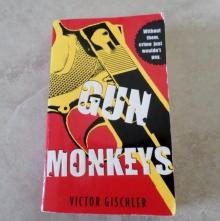 Gun Monkeys
Gun Monkeys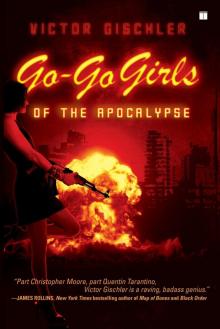 Go-Go Girls of the Apocalypse
Go-Go Girls of the Apocalypse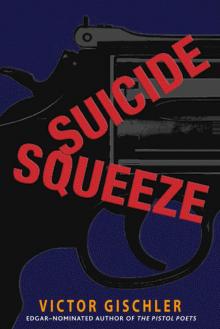 Suicide Squeeze
Suicide Squeeze The Pistol Poets
The Pistol Poets POPCORN
POPCORN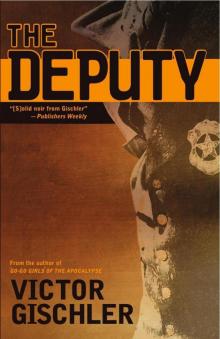 The Deputy
The Deputy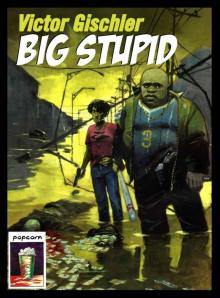 Big Stupid (POPCORN)
Big Stupid (POPCORN) Pistol Poets
Pistol Poets Shotgun Opera
Shotgun Opera The Tattooed Duchess (A Fire Beneath the Skin Book 2)
The Tattooed Duchess (A Fire Beneath the Skin Book 2) Ink Mage
Ink Mage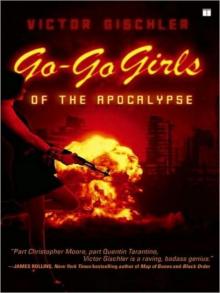 Go-Go Girls of the Apocalypse: A Novel
Go-Go Girls of the Apocalypse: A Novel Stay
Stay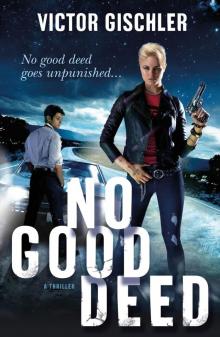 No Good Deed
No Good Deed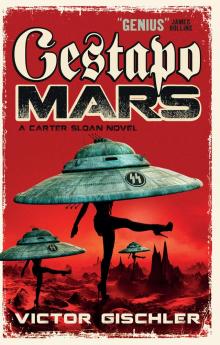 Gestapo Mars
Gestapo Mars A Painted Goddess
A Painted Goddess